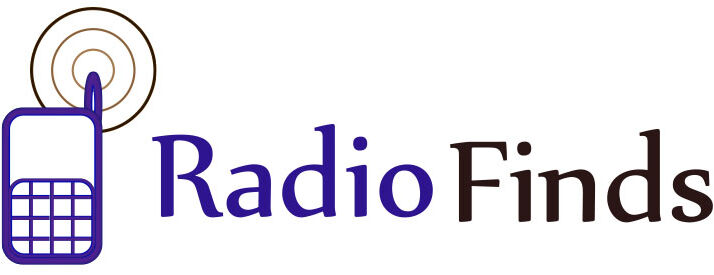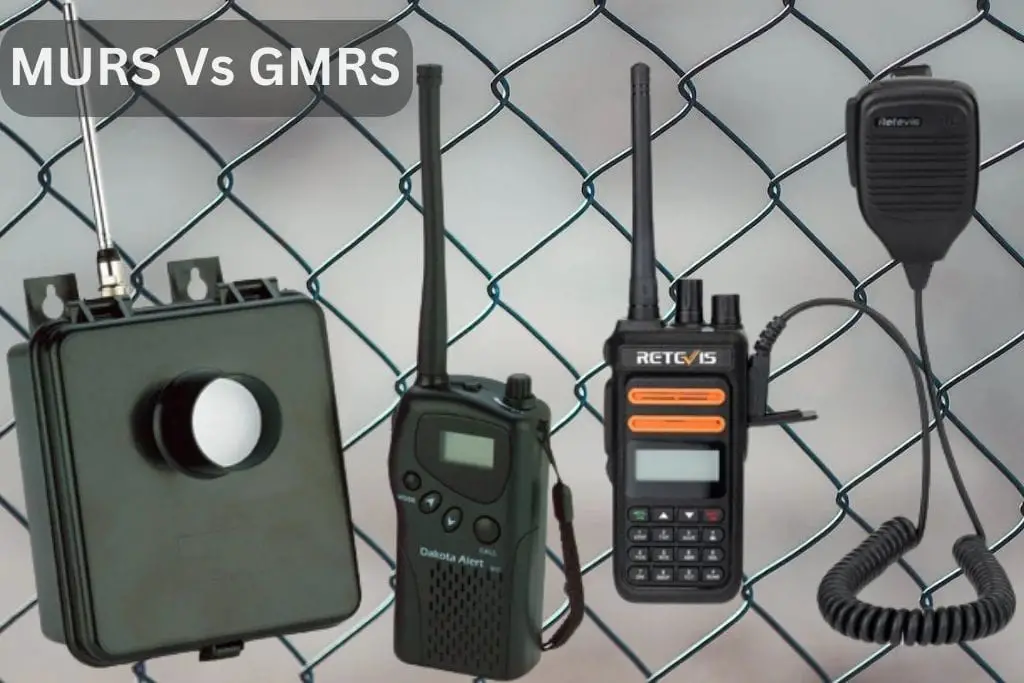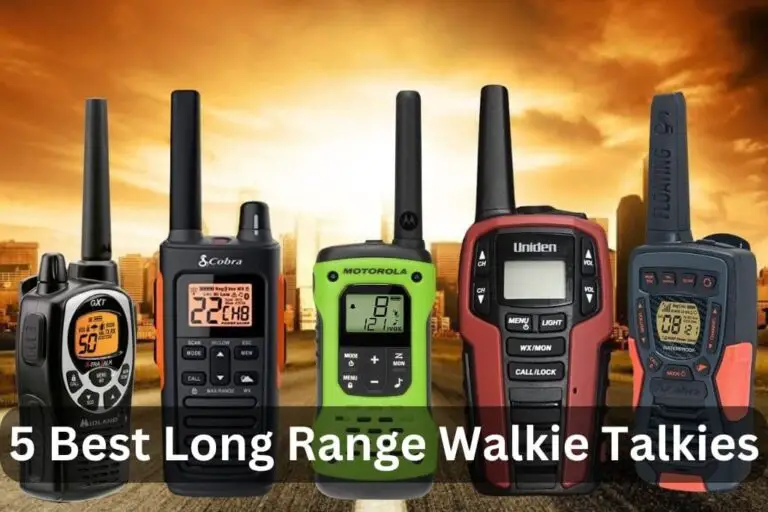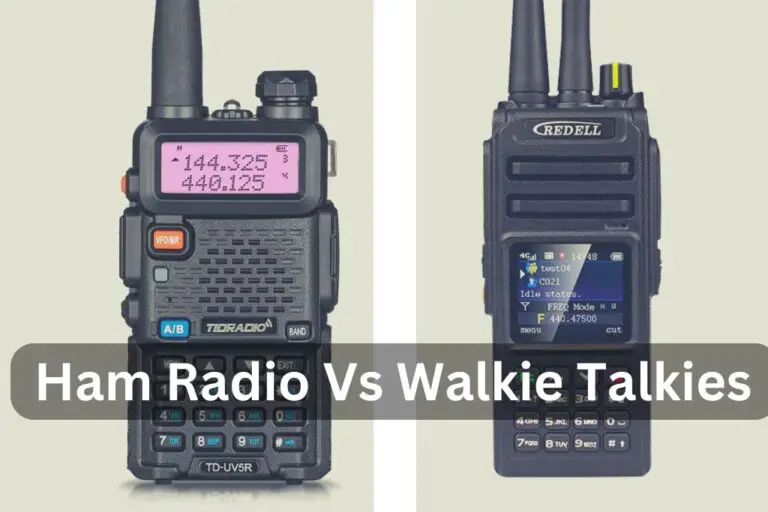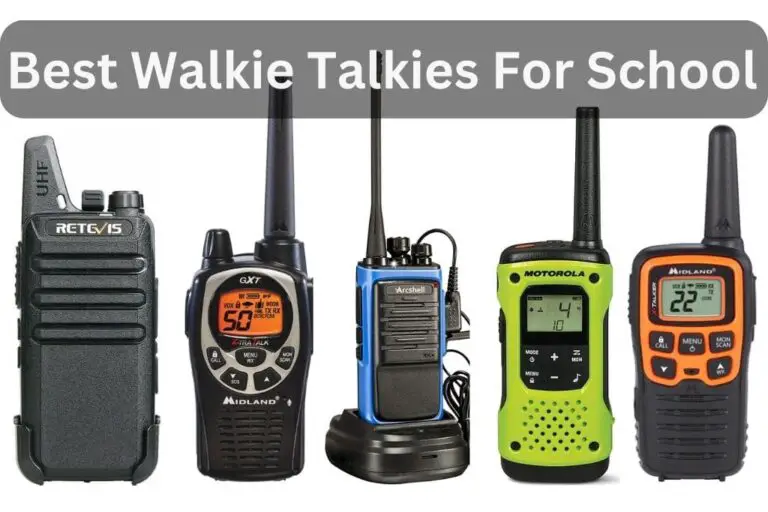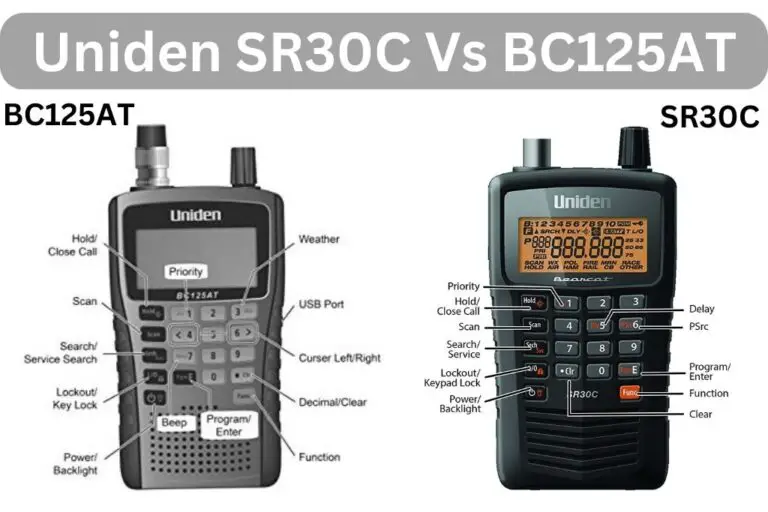MURS Vs GMRS – What’s Difference Between? (Updated 2024)
When it comes to two-way radio services, there are various options available in the market. However, two of most popular are MURS Vs GMRS.
MURS (Multi-Use Radio Service) and GMRS (General Mobile Radio Service) provide reliable communication channels for various purposes, including recreation, commercial, and personal use.
Yet, these two services differ significantly in scope, license requirements, and frequency of use.
This article will explore MURS Vs GMRS differences and help you decide which service is exemplary.
What are MURS and GMRS?
MURS and GMRS are two-way radio services that allow communication over short to moderate distances. MURS is a license-free service, while GMRS requires a Federal Communications Commission (FCC) license.
Both services use FM (Frequency Modulation) technology, which provides clear audio and better resistance to interference than AM (Amplitude Modulation) technology.
MURS and GMRS have similar features and functionalities, including voice communication, channel scanning, and hands-free operation.
Although they are equivalent, a few differences could affect your decision to choose one.
Range Comparison
The range of a two-way radio service refers to the maximum distance it can cover. This distance does not require a repeater or other external device.
MURS and GMRS have different range capabilities due to their frequency allocations and power limits.
MURS operates on five VHF (Very High Frequency) channels between 151.820 MHz and 154.600 MHz, with a power limit of 2 watts.
The range of MURS radios is typically up to 2 miles in urban areas. In rural areas, the range can extend up to 5 miles.
GMRS, on the other hand, operates on 22 channels between 462.550 MHz and 467.725 MHz, with a power limit of 50 watts for repeater stations and 5 watts for mobile stations.
The range of GMRS radios typically varies. In urban areas, it can reach up to 5 miles, while in rural areas, it can reach up to 25 miles. This range is dependent on the terrain and other factors.
Licensing Requirements
One of the significant differences between MURS and GMRS is the licensing requirements. MURS is a license-free service, which means anyone can use MURS radios without obtaining a license from the FCC.
Rules and laws must be noted, and this is to avoid interference with other radio services and to comply with FCC standards.
GMRS, on the other hand, requires a license from the FCC, which involves a fee and a test. The permit lasts ten years and covers all family members using GMRS radios.
GMRS license holders can operate on all GMRS channels. They have a higher power limit than MURS radios, which enables them to cover longer distances.
Frequency Usage
Another critical difference between MURS and GMRS is their frequency usage. MURS operates on VHF frequencies, which are less congested and less prone to interference than UHF (Ultra High Frequency) frequencies.
VHF frequencies are also better suited for outdoor and rural areas, where there are fewer obstacles to the radio signals.
GMRS operates on UHF frequencies, which are more congested and prone to interference than VHF frequencies.
UHF frequencies are also better suited for indoor and urban areas, with more obstacles to the radio signals.
Therefore, the choice between MURS and GMRS is on the system where you plan to use the radios.
Interference and Privacy
Interference and privacy are important factors when choosing a two-way radio service. MURS and GMRS have different interference and privacy capabilities, depending on the number of channels and privacy codes available.
MURS has five channels, which means there are fewer chances of interference from other radio services.
However, no privacy codes are available, meaning anyone can listen to your conversations on the same channel. This may be better for personal or business communications that require more confidence.
GMRS has 22 channels, which provide more options to avoid interference from other radio services.
Additionally, GMRS radios have privacy codes, which allow you to encrypt and keep discussions private. This is useful for personal or business communications that require privacy and security.
Cost Comparison
When choosing a two-way radio service, the cost is an essential factor to consider. On average, MURS is less expensive than GMRS.
It has fewer power constraints and features and does not require a license. MURS radios range in price from $20 to $100, depending on the manufacturer and model.
GMRS, on the other hand, requires a license, which involves a fee and a test. GMRS radios are also more powerful and feature-rich than MURS radios, which means they are more expensive.
Depending on the brand and model, GMRS radios can cost between $50 and $200.
Popular Brands and Models
Many brands and models of MURS and GMRS radios are available. Some of the popular ones include:
MURS Radios:
- Motorola RMM2050,
- Midland MXT105,
- Uniden SX167-2C
GMRS Radios:
- Motorola T600 H2O,
- Midland GXT1000VP4,
- Cobra ACXT1035R FLT
Each brand and model has unique features and specifications, which can affect the range, battery life, durability, and some factors.
Pros and Cons of MURS
Pros:
- License-free service
- Low power limits, which are less likely to cause interference
- VHF frequencies, which are better suited for outdoor and rural areas
- Lower cost compared to GMRS
Cons:
- Limited range and coverage
- No privacy codes, which may not be ideal for confidential communications
- Fewer features and options compared to GMRS
Pros and Cons of GMRS
Pros:
- Higher power limits, which provide a more extended range and coverage
- UHF frequencies, which are better suited for indoor and urban areas
- More channels and privacy codes offer more options to avoid interference and ensure privacy
- More powerful and feature-rich compared to MURS
Cons:
- Requires a license from the FCC, which involves a fee and a test
- More expensive compared to MURS
- More prone to interference and congestion compared to MURS
Which One Should You Choose?
The choice between MURS and GMRS depends on your specific needs and preferences. “MURS may be your best choice if you only need a two-way radio for recreation or personal use.
Suppose you do not have a license. It’s Ok. You can use it.”MURS is also suitable for outdoor and rural areas with limited range and coverage.
If you need a two-way radio for commercial or business use, GMRS may be the better choice for you. It offers a more extended range and coverage.
GMRS offers more channels and privacy codes, which provide more options to avoid interference and ensure privacy.
GMRS is also more powerful and feature-rich than MURS, which can be helpful for specific applications.
You can consult a radio specialist if you still choose a service. Alternatively, you can further research to determine which suits your needs and budget best.
Final Thought : (MURS Vs GMRS)
In conclusion, both MURS and GMRS are two-way radio services. They provide reliable and effective communication over short to medium ranges.
They have different frequency bands, power limits, channel capacities, and privacy features, which make them suitable for various applications and environments.
MURS is a license-free service that operates on VHF frequencies, with fewer channels and no privacy codes. It is suitable for outdoor and rural areas, where the range and coverage are limited, and for recreation1 or personal use.
GMRS, on the other hand, requires a license from the FCC and operates on UHF frequencies. It offers more channels and privacy codes, which provide more options to avoid interference and ensure privacy.
It is suitable for commercial or business use and applications requiring a more extended range and coverage.
Ultimately, the choice between MURS and GMRS depends on your needs, preferences, and budget. This information lets you choose the two-way radio service that best suits your requirements.
Frequently Ask Questions
1. Do I Need A License To Use Murs Radios?
No, MURS is a license-free service, and anyone can use MURS radios without a license.
2. Can I Use Gmrs Radios For Personal Or Recreational Use?
Yes, GMRS radios can be used for personal, recreational, commercial, or business use.
3. Can I Use Murs Radios Indoors Or In Urban Areas?
MURS radios are suitable for outdoor and rural areas but may need more reliable coverage indoors or in urban areas.
4. What Is The Cost Of Obtain A Gmrs License?
The FCC charges a fee of $70 for a GMRS license, valid for ten years.
5. Are Murs Radios Compatible With Gmrs Radios?
No, MURS and GMRS radios operate on different frequency bands and are not compatible with each other.
